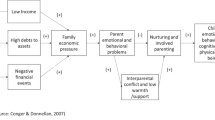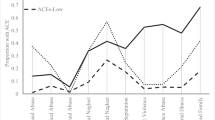Abstract
The current study was designed to explore the cognitions of African-American mothers about the importance of the first 3 years of life for brain development, and to determine the relations between those cognitions and important parenting beliefs. We collected survey data over a 1-week period from a diverse sample of 222 African-American mothers waiting for preventive and minor acute care appointments in six pediatric waiting rooms in Memphis, TN. Latent Class Analysis revealed two groups of mothers: one that was aware of the importance of the first 3 years for brain development (about 56 %), and one that is less aware (about 44 %). Mothers in the two latent classes had significantly different parenting beliefs about spoiling versus nurturing and the importance of stable child care arrangements, but not about corporal punishment of infants. Poverty and education significantly affected latent class membership. Parenting education interventions might be better targeted and more effective when informed by participants’ understanding of early brain development.



Similar content being viewed by others
References
American Academy of Pediatrics Committee on Psychosocial Aspects of Child and Family Health. (1998). Guidance for effective discipline. Pediatrics, 101(4), 723–728.
Azar, S., Nix, R. L., & Makin-Byrd, K. N. (2005). Parenting schemas and the process of change. Journal of Family and Marital Therapy, 31(1), 35–58.
Azar, S., Reitz, E. B., & Goslin, M. C. (2008). Mothering: Thinking is part of the job description: Application of cognitive views to understanding maladaptive parenting and doing intervention and prevention work. Journal of Applied Developmental Psychology, 29, 295–304.
Biemer, P. P. (2011). Latent class analysis of survey error. Hoboken, NJ: Wiley.
Borenstein, M., Hedges, L. V., Higgins, J. P. T. & Rothstein, H. R. (2009). Introduction to meta-analysis (pp. 26–28). Chichester, UK: Wiley.
Bornstein, M., Cote, L. R., Haynes, M., Hahn, C., & Park, Y. (2010). Parenting knowledge: Experiential and sociodemographic factors in European American mothers of young children. Developmental Psychology, 46(6), 1677–1693.
Bornstein, M. H., Putnick, D. L., & Lansford, J. E. (2011). Parenting attributions and attitudes in cross-cultural perspective. Parenting: Science and Practice, 11, 214–237.
Burchinal, M., Skinner, D., & Reznick, J. S. (2010). European American and African American mothers’ beliefs about parenting and disciplining infants: A mixed-methods analysis. Parenting: Science and Practice, 10, 79–96.
Cain, D., & Combs-Orme, T. (2005). Family structure effects on parenting stress and practices in the African American family. Journal of Sociology and Social Welfare, XXXII(2), 19–40.
Civitas Initiative, Zero to Three, & Brio Corporation. (2000). What grownups understand about child development: A national benchmark survey. Washington, DC: Zero to Three, National Center for Infants, Toddlers, and Families.
Collins, L. M., & Lanza, S. T. (2010). Latent class and latent transition analysis: With applications in the social, behavioral, and health sciences. Hoboken, NJ: Wiley.
Combs-Orme, T., & Cain, D. S. (2008). Predictors of mothers’ use of spanking with their infants. Child Abuse & Neglect, 32, 649–657.
Combs-Orme, T., Holden, B., & Herrod, H. (2011). Anticipatory guidance and early child development: Pediatrician advice, unmet needs, and parent behaviors. Clinical Pediatrics, 50, 729–737.
Combs-Orme, T., Wilson, E., Cain, D. S., Page, T., & Kirby, L. D. (2003). Context-based parenting in infancy: Background and conceptual issues. Child and Adolescent Social Work, 20(6), 437–472.
DiPietro, J. A. (2000). Baby and the brain: Advances in child development. Annual Review of Public Health, 21, 455–471.
Everitt, B. S., Landau, S., Leese, M., & Stahl, D. (2011). Cluster analysis (5th ed.). Hoboken, NJ: Wiley.
Flynn, C. P. (1996). Regional differences in spanking experiences and attitudes: A comparison of Northeastern and Southern college students. Journal of Family Violence, 11(1), 59–80.
Fox, S. E., Levitt, P., & Nelson, C. A. (2010). How the timing and quality of early experiences influence the development of brain architecture. Child Development, 81(1), 28–40.
Gershoff, E. T. (2002). Corporal punishment by parents and associated child behaviors and experiences: A meta-analytic and theoretical review. Psychological Bulletin, 128(4), 539–579.
Heckman, J. (2006). Skill formation and the economics of investing in disadvantaged children. Science, 312(30), 1900–1902.
Henson, J. M., Reise, S. P., & Kim, K. H. (2007). Detecting mixtures from structural model differences using latent variable mixture modeling: A comparison of relative model fit statistics. Structural Equation Modeling: A Multidisciplinary Journal, 14, 202–226.
Heston, J., & Hoffman, M. (2007). Survival guides for preschool parents. Memphis, TN: Assisi Foundation of Memphis.
Landry, S. H., Smith, K. E., & Swank, P. R. (2003). The importance of parenting during early childhood for school-age development. Developmental Neuropsychology, 24(2–3), 559–591.
Landry, S. H., Smith, K. E., & Swank, P. R. (2006). Responsive parenting: Establishing early foundations for social, communication, and independent problem-solving skills. Developmental Psychology, 42(4), 627–642.
Lugo-Gil, J., & Tamis-LeMonda, C. S. (2008). Family resources and parenting quality: Links to children’s cognitive development across the first 3 years. Child Development, 79(4), 1065–1085.
Luster, T., Rhoades, K., & Haas, B. (1989). The relation between parental values and parenting behavior. Journal of Marriage and Family, 51(1), 139–147.
McLachlan, G. J., & Peel, D. (2000). Finite mixture models. New York: Wiley.
Meltzoff, A. N., & Moore, M. K. (1997). Explaining facial imitation: A theoretical model. Early Development and Parenting, 6, 179–192.
Moll, H., & Tomasello, M. (2010). Current biology, 20(20), E872–E875.
Mosby, L., Rawls, A. W., Meehan, A. J., Mays, E., & Pettinari, C. J. (1999). Troubles in interracial talk about discipline: An examination of African American child rearing narratives. Journal of Comparative Family Studies, 30(3), 489–527.
Muthén, B. (2008). Latent variable hybrids: Overview of old and new models. In G. R. Hancock & K. M. Samuelsen (Eds.), Advances in latent variable mixture models (pp. 1–24). Charlotte, NC: Information Age Publishing.
Muthén, L. K. & Muthén, B. O. (1998–2010) Mplus user’s guide (6th ed.). Los Angeles, CA: Muthén & Muthén.
Nylund, K. L., Asparoutiov, T., & Muthén, B. (2007). Deciding on the number of classes in latent class analysis and growth mixture modeling: A Monte Carlo simulation study. Structural Equation Modeling: A Multidisciplinary Journal, 14, 535–569.
Pelucci, B., Hay, J. F., & Saffran, J. R. (2009). Statistical learning in a natural language by 8-month-old infants. Child Development, 80(3), 674–685.
Ramaswany, V., DeSarbo, W., & Robinson, W. (1993). An empirical pooling approach for estimating marketing mix elasticities with PIMS data. Marketing Science, 12, 103–124.
Schwarz, G. (1978). Estimating the dimension of a model. Annals of Statistics, 6, 461–464.
Sclove, S. L. (1987). Application of model-selection criteria to some problems in multivariate analysis. Psychometrika, 52, 333–343.
Sheridan, M. & Nelson, C. A. (2009). Neurobiology of fetal and infant development. Implications for infant mental health. In C.H. Zeanah (Ed.), Handbook of infant mental health (3rd Ed.). New York: The Guilford Press.
Shonkoff, J. P., Phillips, D., National Research Council. (2000). Committee on Integrating the Science of Early Childhood Development. From neurons to neighborhoods: The science of early child development. Washington, DC: National Academies Press.
Sigel, I.E., McGillicuddy-DeLisi, A. V. & Goodnow, J. J. (1992). Parental belief systems: The psychological consequences for children. (2nd Ed.). Hillsdale, NJ: L. Erlbaum Associates.
Singh, J., Hallmayer, J., & Illes, J. (2007). Interacting and paradoxical forces in neuroscience and society. Nature Reviews Neuroscience, 8(2), 153–160.
Smyke, A. T., Boris, N. W., & Alexander, G. M. (2002). Fear of spoiling in at-risk African American mothers. Child Psychiatry and Human Development, 32(4), 295–307.
Tierney, A. L., & Nelson, C. A. (2009). Brain development and the role of experience in the early years. Zero to Three, 30(2), 9–13.
Tran, H., & Weinraub, M. (2006). Child care effects in context: Quality, stability, and multiplicity in nonmaternal child care arrangements during the first 15 months of life. Developmental Psychology, 42(3), 566–582.
United States Census. (2012). Department of Commerce. Accessed August 19, 2012, from http://quickfacts.census.gov/qfd/states/47/4748000.html
Acknowledgments
The authors gratefully acknowledge the financial support of The Urban Child Institute in Memphis, Tennessee, and our colleagues Dr. Henry Herrod and Ms. Barbara Holden Nixon there for their contributions to the larger study on which this manuscript was based. We are grateful to the pediatricians and their staffs who allowed us to conduct this study with their patients, and especially to the participants who gave their time to be interviewed.
Author information
Authors and Affiliations
Corresponding author
Rights and permissions
About this article
Cite this article
Combs-Orme, T., Orme, J.G. & Lefmann, T. Early Brain Development: African-American Mothers’ Cognitions about the First Three Years. Child Adolesc Soc Work J 30, 329–344 (2013). https://doi.org/10.1007/s10560-012-0294-9
Published:
Issue Date:
DOI: https://doi.org/10.1007/s10560-012-0294-9




